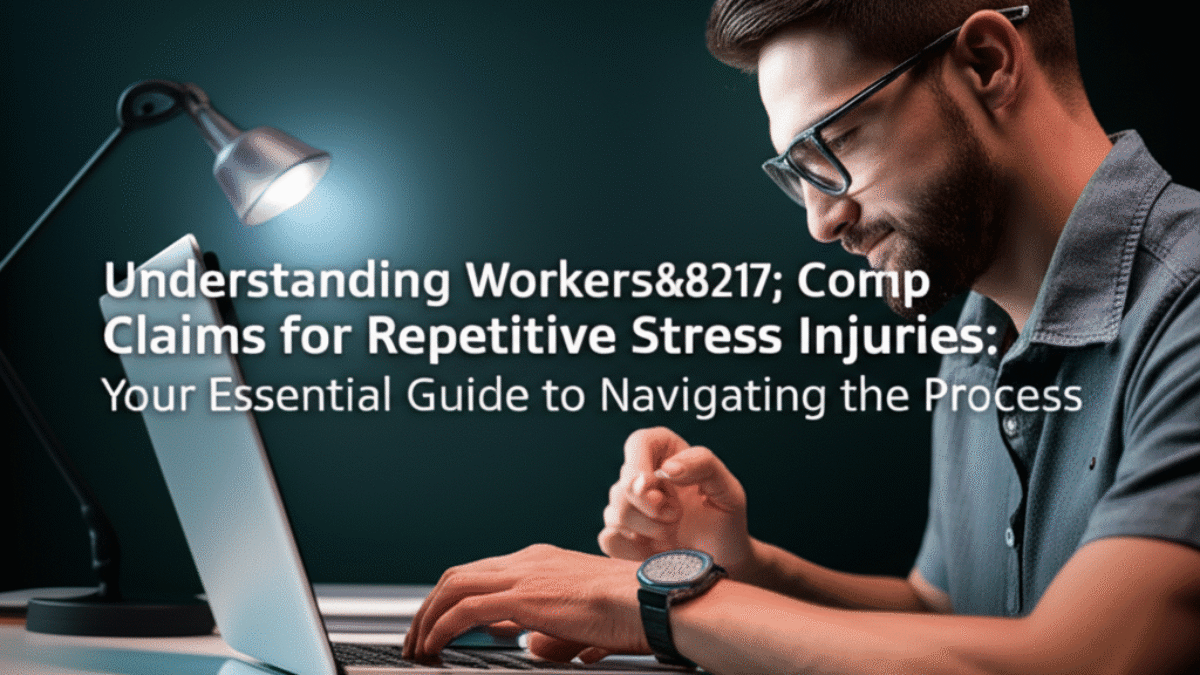Introduction
Have you ever felt a nagging pain in your wrist or shoulder after long hours at your desk? You’re not alone. Many workers experience repetitive stress injuries (RSIs) due to the demands of their jobs. These injuries can be debilitating, impacting not just your work but your overall quality of life. It’s crucial to understand the workers’ compensation claims process related to RSIs so you can get the help you need. In this guide, we will break down everything you need to know about navigating workers’ comp claims for repetitive stress injuries.
In this article, you’ll discover what RSIs are, how they differ from other types of injuries, and the specific steps you need to take to file a workers’ comp claim. We’ll also explore common misconceptions, the benefits of filing a claim, and practical tips for navigating the often confusing claims process. By the end of this guide, you will have a clear roadmap to help you successfully manage your RSI and ensure you’re compensated for your injuries.
So, whether you’re currently dealing with an injury or just want to be prepared, let’s dive into the essential information about workers’ comp claims for repetitive stress injuries!
Understanding Repetitive Stress Injuries
Repetitive stress injuries, commonly referred to as RSIs, are conditions that develop over time due to repetitive motions or sustained awkward postures. Unlike acute injuries, which occur suddenly (like a fall or a car accident), RSIs are often the result of gradual wear and tear on muscles, tendons, and nerves. Examples of RSIs include carpal tunnel syndrome, tendinitis, and bursitis. These injuries can manifest in various ways, including pain, swelling, and decreased range of motion.
What Causes Repetitive Stress Injuries?
Understanding the causes of RSIs is key to prevention and treatment. Common factors include:
- Repetitive Movements: Tasks that require the same motion, such as typing or assembly line work, can lead to RSIs.
- Awkward Postures: Sitting or standing in an uncomfortable position for extended periods can strain your muscles.
- Lack of Rest: Not taking breaks can prevent your body from recovering from repetitive tasks.
- Improper Equipment: Using tools or furniture that aren’t ergonomically designed can strain your body.
How Are RSIs Diagnosed?
If you suspect you have an RSI, it’s essential to consult a healthcare professional. Diagnosis typically involves:
- Medical History: Your doctor will ask about your symptoms and work-related activities.
- Physical Examination: They may assess your range of motion and check for pain points.
- Imaging Tests: In some cases, X-rays or MRIs may be necessary to rule out other conditions.
Key Components of Workers’ Compensation Claims
Now that you understand what RSIs are, it’s time to dive into the workers’ compensation claims process. Workers’ compensation is a type of insurance that provides benefits to employees who suffer job-related injuries or illnesses. Here are the essential components of the workers’ compensation system as it relates to RSIs:
Eligibility for Workers’ Compensation
To be eligible for workers’ compensation for an RSI, you typically need to meet the following criteria:
- Employment Status: You must be an employee (not an independent contractor).
- Job-Related Injury: The injury must arise out of and in the course of your employment.
- Timely Reporting: You must report the injury to your employer within the timeframe required by your state.
Filing a Claim
The process of filing a workers’ comp claim for an RSI can be daunting, but understanding the steps involved can make it easier:
- Report Your Injury: Notify your employer about your RSI as soon as possible. Keep a record of your communication.
- Seek Medical Attention: Visit a healthcare provider for a diagnosis and treatment.
- Complete Claim Forms: Fill out the necessary workers’ compensation claim forms provided by your employer or state agency.
- Submit Documentation: Attach any required documentation, such as medical records and incident reports, to your claim.
- Follow Up: Stay in contact with your employer and the claims adjuster to ensure your claim is processed.
Understanding the Benefits
If your claim is approved, you may be entitled to several benefits, including:
- Medical Expenses: Coverage for doctor visits, medications, and rehabilitation related to your RSI.
- Wage Loss Benefits: Compensation for lost wages if you cannot work due to your injury.
- Disability Benefits: Payments for permanent impairments resulting from your RSI.
- Vocational Rehabilitation: Services to help you return to work or find new employment if you cannot return to your previous job.
Benefits and Importance
Understanding the benefits and importance of filing a workers’ compensation claim for RSIs can empower you to take action. Here are some key points:
Financial Security
Filing a workers’ comp claim ensures that you have financial support while dealing with your injury. This can alleviate stress and allow you to focus on recovery without worrying about how to pay your bills.
Access to Medical Care
Workers’ compensation provides access to necessary medical care. This is crucial for recovery, as untreated RSIs can lead to long-term damage.
Job Protection
Filing a claim typically protects your job. Most states have laws preventing employers from retaliating against employees who file a claim. This means you can seek help without fear of losing your job.
Encouraging Workplace Safety
By filing a claim, you contribute to a culture of safety in the workplace. Reporting RSIs can prompt employers to assess and improve workplace ergonomics, benefiting all employees.
Practical Applications
Understanding the practical applications of the workers’ comp claims process can make a significant difference in your experience. Here are some actionable steps to consider:
Document Everything
Keep thorough records of your injury, treatment, and communications with your employer. This documentation can be invaluable if you face challenges during the claims process. Consider maintaining:
- Medical records and receipts
- Emails and messages regarding your injury
- Notes from conversations with your employer or healthcare provider
Consult a Professional
If you’re feeling overwhelmed, consider consulting a workers’ compensation attorney. They can help you understand your rights, guide you through the claims process, and advocate for you if your claim is denied.
Follow Up Regularly
Stay proactive in following up on your claim. Contact your employer and the claims adjuster regularly to check on the status of your claim. If there are delays, inquire about the reasons and what you can do to expedite the process.
Stay Informed
Each state has different laws regarding workers’ compensation. Familiarize yourself with your state’s workers’ comp regulations to ensure you’re aware of your rights and responsibilities.
Frequently Asked Questions
What is a repetitive stress injury?
A repetitive stress injury (RSI) is a type of injury that occurs over time due to repetitive motions or sustained awkward postures. Common examples include carpal tunnel syndrome and tendinitis. These injuries can cause pain, swelling, and decreased function in the affected area.
How do I know if I have an RSI?
If you experience persistent pain or discomfort in a specific area after repetitive tasks, you might have an RSI. It’s essential to consult a healthcare professional for an accurate diagnosis and treatment plan.
What should I do if I think I have an RSI?
If you suspect you have an RSI, the first step is to report it to your employer and seek medical attention. A healthcare provider can evaluate your condition and recommend appropriate treatment, which is crucial for recovery.
Can I file a workers’ comp claim for an RSI?
Yes, you can file a workers’ compensation claim for an RSI if it is work-related. Ensure you report your injury promptly and follow your state’s filing procedures to maximize your chances of approval.
What benefits can I receive from a workers’ comp claim for an RSI?
If your claim is approved, you may receive benefits such as coverage for medical expenses, wage loss benefits, disability benefits, and vocational rehabilitation services to help you return to work.
What if my workers’ comp claim is denied?
If your claim is denied, don’t lose hope. You can appeal the decision. Consider seeking legal advice from a workers’ compensation attorney who can help you understand the reasons for the denial and guide you through the appeals process.
Conclusion
In conclusion, understanding workers’ comp claims for repetitive stress injuries is crucial for anyone affected by these debilitating conditions. By knowing what RSIs are, how to file a claim, and the benefits available to you, you can take proactive steps toward recovery and ensure you’re compensated for your injuries.
Remember, the claims process can be complex, but you’re not alone. By documenting your injury, seeking professional guidance, and staying informed about your rights, you can navigate this process with confidence. Don’t hesitate to reach out for help—whether that’s from your employer, healthcare professionals, or legal experts. Your health and well-being are worth it!
Take action today by reviewing your workplace practices and considering ergonomic changes that can prevent RSIs. If you or someone you know is struggling with an RSI, share this guide to empower others with the knowledge they need to advocate for their health.


